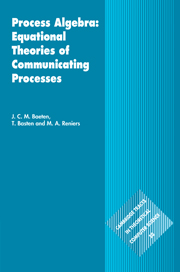Book contents
- Frontmatter
- Contents
- Foreword
- Foreword
- Foreword
- Preface
- 1 Process algebra
- 2 Preliminaries
- 3 Transition systems
- 4 Basic process theory
- 5 Recursion
- 6 Sequential processes
- 7 Parallel and communicating processes
- 8 Abstraction
- 9 Timing
- 10 Data and states
- 11 Features
- 12 Semantics
- Bibliography
- Index of Symbols and Notations
- Index of Authors
- Index of Subjects
Foreword
Published online by Cambridge University Press: 05 July 2014
- Frontmatter
- Contents
- Foreword
- Foreword
- Foreword
- Preface
- 1 Process algebra
- 2 Preliminaries
- 3 Transition systems
- 4 Basic process theory
- 5 Recursion
- 6 Sequential processes
- 7 Parallel and communicating processes
- 8 Abstraction
- 9 Timing
- 10 Data and states
- 11 Features
- 12 Semantics
- Bibliography
- Index of Symbols and Notations
- Index of Authors
- Index of Subjects
Summary
Algebra is the simplest of all branches of mathematics. After the study of numerical calculation and arithmetic, algebra is the first school subject which gives the student an introduction to the generality and power of mathematical abstraction, and a taste of mathematical proof by symbolic reasoning. Only the simplest reasoning principle is required: the substitution of equals for equals. (Even computers are now quite good at it.) Nevertheless, the search for algebraic proof still presents a fascinating puzzle for the human mathematician, and yields results of surprising brevity and pleasing elegance.
A more systematic study of algebra provides a family tree that unifies the study of many of the other branches of mathematics. It identifies the basic mathematical axioms that are common to a whole sub-family of branches. The basic theorems that are proved from these axioms will be true in every branch of mathematics which shares them. At each branching point in the tree, the differences between the branches are succinctly highlighted by their choice between a pair of mutually contradictory axioms. In this way, algebra is both cumulative in its progress along the branches, and modular at its branching points.
It is a surprise to many computer programmers that computer programs, with all their astronomical complexity of structure and behavior, are as amenable to the axioms of algebra as simple numbers were at school. Indeed, algebra scales well from the small to the large.
- Type
- Chapter
- Information
- Publisher: Cambridge University PressPrint publication year: 2009



